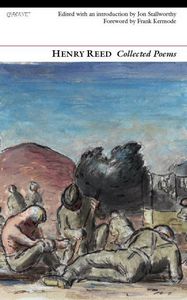Henry Reed was one of the most celebrated British poets of World War II. This collection traces Reed's life and attempts to establish Reed alongside the other great war poets of the 20th century through a critical assessment of his poems, including his many unpublished poems, Lessons of the War, translations, songs, and early fragments.
Henry Reed (February 22, 1914 - December 8, 1986) was a British poet, translator, radio dramatist and journalist.
He was born in Birmingham and educated at King Edward VI School, Aston, followed by the University of Birmingham. At university he associated with W. H. Auden, Louis MacNeice and Walter Allen. He went on to study for an MA and then worked as a teacher and journalist. He was called up to the Army in 1941, spending most of the war as a Japanese translator.
His most famous poem is Lessons of the War, a witty parody of British army basic training during World War II, which suffered from a lack of equipment at that time. Originally published in New Statesman and Nation (August 1942), the series was later published in A Map of Verona in 1946, and was his only collection to be published within his lifetime. Another anthologised poem is Chard Whitlow, a clever satire of T. S. Eliot's Burnt Norton.
Unfortunately for Reed he was forever being confused with the much better known Sir Herbert Read; the two men were unrelated. Reed responded to this confusion by naming his alter ego biographer in the Hilda Tablet plays "Herbert Reeve" and then by having everyone else get the name slightly wrong.
